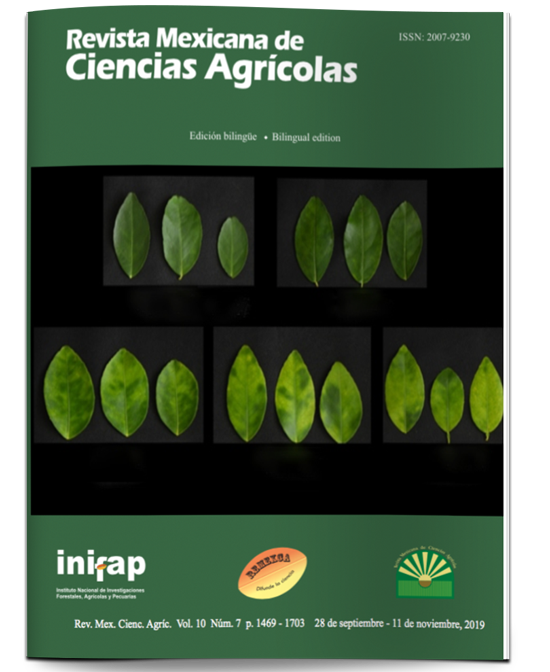Salicylic acid induces tolerance to cryogenic stress in Solanum tuberosum
DOI:
https://doi.org/10.29312/remexca.v10i7.1627Keywords:
in vitro regeneration, potato, ultra low temperatureAbstract
A common problem in cryogenic processes is survival at ultra low temperature (-196 °C). Based on the physiological effects of salicylic acid (AS) on the signaling of stress tolerance responses, the objective was to evaluate the effect of AS on increasing survival and on the growth of potato buds undergoing cryogenics. Microplants of the advanced clone 06-27 of the Germplasm Bank in vitro of the Potato Program in Metepec State of Mexico, Mexico, were incubated for 28 days in AS (0, 10-6 and 10-5 M) and subsequently subjected to cryogenic process. Effect of AS in plant regeneration: a significant increase in survival was observed in plants pretreated with AS 10-5 and 10-6 M with respect to the control (1.66-2.04 times respectively). Fresh weight, stem length and root significantly increased in microplants pretreated with AS with respect to the control. Cryogenesis: both concentrations of 10-5 and 10-6 M AS induced significantly greater survival (2.17-3.21 times respectively) of explants to cryogenics. Plants preincubated in AS and regenerated after being subjected to cryogenics for 1 h significantly increased root length. The control showed callus formation, absent in the plants treated with AS. The AS-cryogenic combination favored the development of plants subjected to methods that employ ultra-low temperatures in potatoes for the purpose of germplasm cryopreservation or cryotherapy to obtain virus-free materials.
Downloads
Published
How to Cite
Issue
Section
License
The authors who publish in Revista Mexicana de Ciencias Agrícolas accept the following conditions:
In accordance with copyright laws, Revista Mexicana de Ciencias Agrícolas recognizes and respects the authors’ moral right and ownership of property rights which will be transferred to the journal for dissemination in open access. Invariably, all the authors have to sign a letter of transfer of property rights and of originality of the article to Instituto Nacional de Investigaciones Forestales, Agrícolas y Pecuarias (INIFAP) [National Institute of Forestry, Agricultural and Livestock Research]. The author(s) must pay a fee for the reception of articles before proceeding to editorial review.
All the texts published by Revista Mexicana de Ciencias Agrícolas —with no exception— are distributed under a Creative Commons License Attribution-NonCommercial 4.0 International (CC BY-NC 4.0), which allows third parties to use the publication as long as the work’s authorship and its first publication in this journal are mentioned.
The author(s) can enter into independent and additional contractual agreements for the nonexclusive distribution of the version of the article published in Revista Mexicana de Ciencias Agrícolas (for example include it into an institutional repository or publish it in a book) as long as it is clearly and explicitly indicated that the work was published for the first time in Revista Mexicana de Ciencias Agrícolas.
For all the above, the authors shall send the Letter-transfer of Property Rights for the first publication duly filled in and signed by the author(s). This form must be sent as a PDF file to: revista_atm@yahoo.com.mx; cienciasagricola@inifap.gob.mx; remexca2017@gmail.
This work is licensed under a Creative Commons Attribution-Noncommercial 4.0 International license.



